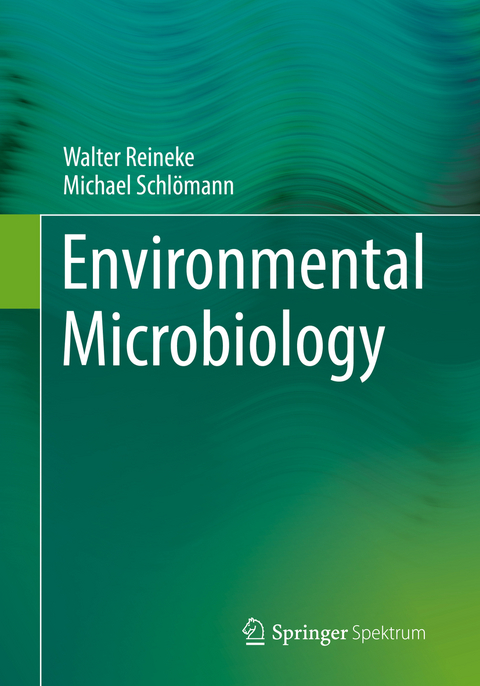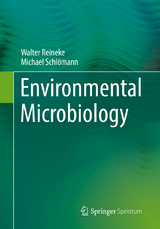Environmental Microbiology
Springer Berlin (Verlag)
978-3-662-66546-6 (ISBN)
This textbook addresses global and local environmental problems and the involvement of microorganisms in their development and remediation. In particular, methodological aspects, some of them molecular genetic, for the study of microbial communities are considered. Overall, the prominent role of microorganisms in various material cycles is presented. In addition to biochemical principles for the degradation of environmental pollutants, the use of microorganisms in environmental biotechnological processes for the purification of air, water or soil as well as in environmentally friendly production processes is discussed. The book is intended for biologists with an interest in environmental microbiological issues, but also for students of process or environmental engineering, geoecology or geology, as well as students of other environmental science disciplines. For the 3rd edition, the authors have completely revised, corrected, updated and supplemented the book.
Professor Dr. Walter Reineke has been Professor of Microbiology at the University of Wuppertal since 1982, where he was involved in teaching both the Food Chemistry and Chemistry courses. He has been retired since August 2013. He studied biology in Bochum and Göttingen and began his first work on the influence of structural elements in environmental chemicals on microbial degradation in 1972 with Hans-Joachim Knackmuss. His doctorate followed in 1976 in Göttingen with a topic on the microbial degradation of chloroaromatics, followed by a postdoctoral period at the Society for Radiation and Environmental Research. He has remained faithful to the topic of environmental chemicals / chloroaromatics to this day. The research group is interested in the biochemistry and genetic basis of microbial degradation pathways. The focus is on the chemistry of metabolites. Using strains from contaminated sites and those generated by patchwork assembly in the laboratory, the question of evolution of the degradation pathways is addressed. Furthermore, an attempt is made to optimize and understand enzymes by directed evolution. The purification of contaminated soils by special strains was analysed. Professor Dr. Michael Schlömann was appointed Endowed Professor of Environmental Microbiology of the Deutsche Bundesstiftung Umwelt at the Technische Universität Bergakademie Freiberg in 1998 and has been Deputy Director of the Interdisciplinary Ecological Centre of the University since 1999. He studied biology and science of politics at the University of Göttingen and did his PhD at the University of Stuttgart with Hans-Joachim Knackmuss on biochemical work on microbial fluoroaromatic degradation. A postdoctoral stay with Nicholas Ornston at Yale University laid the foundation for later genetic work on the evolution of degradation pathways. He received the Academy Award for Biology from the Academy of Sciences in Göttingen in 1991. Research activities focus on the enzymatics, genetics, evolution and diversity of bacterial chlorinated aromatic degradation and the detection of genes or gene expression at contaminated sites. In addition, the physiology of rhodococci and in particular their biosurfactant synthesis play an essential role. Finally, microbial communities associated with acidic waters from mining activities, mining processes and upwelling deep waters are analyzed.
Global Environment. Climate and microorganisms.- Microorganisms, actors in the environment.- Relationship between microbial energy production and material cycles.- Carbon cycle.- Environmental chemicals.- Microbial degradation of pollutants.- The microbial nitrogen cycle.- Cycles of sulfur, iron and manganese.- Heavy metals and other toxic inorganic ions.- Microorganisms at different sites: living conditions and adaptation strategies.- Microbial communities. Structural and functional analyses with classical approach.- Microbial communities. Structural and functional analyses with molecular biological approach.- Damage to inorganic materials by microbial activities, biocorrosion.- Biological wastewater treatment.- Biological exhaust air treatment.- Biological soil remediation.- Biological waste treatment.- Biotechnology and environmental protection.- Food for thought.
| Erscheinungsdatum | 10.04.2023 |
|---|---|
| Zusatzinfo | XVI, 603 p. 379 illus., 104 illus. in color. |
| Verlagsort | Berlin |
| Sprache | englisch |
| Maße | 168 x 240 mm |
| Gewicht | 1037 g |
| Themenwelt | Naturwissenschaften ► Biologie ► Mikrobiologie / Immunologie |
| Technik ► Umwelttechnik / Biotechnologie | |
| Schlagworte | Adaptation strategies of microorganisms • biological exhaust air treatment • biological soil remediation • Biotechnology and environmental protection • carbon cycle • Degradation of organic pollutants • Environmental Issues • Environmental Microbiology • Heavy metals • Iron circuit • Manganese circuit • Materials cycle • microbial communities • microbial energy production • microbial nitrogen cycle • Microbiology • microorganisms • Sulphur circuit • Waste treatment |
| ISBN-10 | 3-662-66546-8 / 3662665468 |
| ISBN-13 | 978-3-662-66546-6 / 9783662665466 |
| Zustand | Neuware |
| Informationen gemäß Produktsicherheitsverordnung (GPSR) | |
| Haben Sie eine Frage zum Produkt? |
aus dem Bereich




